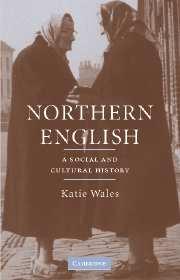Book contents
- Frontmatter
- Contents
- List of illustrations
- Preface
- List of abbreviations and symbols
- 1 ‘The North–South divide’
- 2 The origins of Northern English
- 3 Northern English and the rise of ‘Standard English’
- 4 Northern English after the Industrial Revolution (1750–1950)
- 5 Northern English present and future
- References
- Index of Northern English features
- General index
5 - Northern English present and future
Published online by Cambridge University Press: 22 September 2009
- Frontmatter
- Contents
- List of illustrations
- Preface
- List of abbreviations and symbols
- 1 ‘The North–South divide’
- 2 The origins of Northern English
- 3 Northern English and the rise of ‘Standard English’
- 4 Northern English after the Industrial Revolution (1750–1950)
- 5 Northern English present and future
- References
- Index of Northern English features
- General index
Summary
The 1960s and beyond: the ‘renaissance’ of Northern English?
Three years after the publication of Richard Hoggart's The Uses of Literacy (1957) (see 4.3 above) Granada TV in Manchester broadcast the first episodes of a soap opera Coronation Street set in the working-class area of a fictional Northern town called Weatherfield. The Daily Mirror predicted after the first episode that it was ‘doomed’, with its ‘grim [opening] scene of a row of terraced houses and smoky chimneys’ in grainy black and white (North, ed. 1985: 14). Even other independent television companies in the North and Midlands were hesitant about transmitting it at first, believing that no one ‘south of Stockport’ would appreciate it (Kelly and Jones 2000: 41). Over forty years later it is now the longest running TV soap opera, remains one of the most popular programmes in Britain and has been ‘exported’ all over the world. The idea of the script-writer Tony Warren, born in Salford, it clearly owes part of its inspiration to pre-Second World War writers like Walter Greenwood, whose novel, Love on the Dole (1933) was set in Salford, and later made into a film (1941). Remarkable characters of the early years like Ena Sharples, Minnie Caldwell and Martha Longhurst evoke Greenwood's colourful triumvirate of old Mrs Dorbell, Jikes and Bull, as well as the formidable Northern women of the earlier plays set in Lancashire of Hindle Wakes by Stanley Houghton (1912) and Harold Brighouse's Hobson's Choice (1916), both filmed three times.
- Type
- Chapter
- Information
- Northern EnglishA Social and Cultural History, pp. 160 - 212Publisher: Cambridge University PressPrint publication year: 2006



